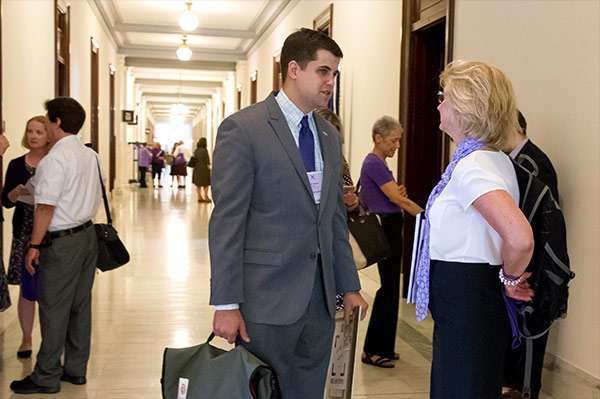Editor’s note: To celebrate the 10th anniversary of Pancreatic Cancer Advocacy Day (which will take place June 19-20 in Washington, D.C.), we asked Josh Yazman, the Advocacy Chair for our National Capital Area volunteer affiliate, to tell us about why Advocacy Day is an extraordinary opportunity for anyone ready to speak out about the importance of federal research funding for pancreatic cancer. Josh attended his first advocacy meetings with his mother when he was just 8 years old. She, too, was a passionate advocate for the cause before she died of pancreatic cancer in 2001.

Josh Yazman attends meetings with advocates from his area and members of Congress at Pancreatic Cancer Advocacy Day, requesting continued research funding for pancreatic cancer.
Pancreatic Cancer Action Network (PanCAN): What memories do you have from your first time doing advocacy work with your mom?
Josh Yazman: I remember following my mom around to talk to our senators and representatives. The most memorable part was seeing how persistent my mom was when our senator tried to dodge the issue she cared about. He didn’t support what my mom was asking him for, but she didn’t let him off the hook without answering her concerns.
PanCAN: What does Advocacy Day mean to you personally?
JY: Advocacy Day is an extension of what PanCAN means to me – both are about empowerment. It’s so easy to feel lonely and helpless when you lose a loved one to pancreatic cancer, but PanCAN and Advocacy Day give us a feeling that we can do something positive in the face of a disease without a cure.
PanCAN: Please share a meaningful story from one of the Advocacy Day events you’ve participated in.
JY: Last year a mother and daughter from Virginia came to Advocacy Day a few months after their husband/dad passed away. They were intimidated by the whole process and were grieving. After a day of training on how to tell their story, what to expect from a meeting with a congressman, and policy issues in pancreatic cancer, both women came back the next morning feeling confident and ready to share their story. They met with their member of Congress, told their story and persuaded their representative to join the Congressional Caucus on the Deadliest Cancers and to co-sponsor the 21st Century Cures Act – exactly what they had come to do.
PanCAN: What is the most important thing you’d like to share with someone who has never attended Advocacy Day?
JY: The most powerful way to advocate for a cause is to tell your story, and the most powerful way to tell your story is to get in the room with your member of Congress or their staff and tell it to their faces. When you’re in the room, you can make sure people in power hear what you know they need to hear, which is that pancreatic cancer is a deadly disease that requires more federal funding to research. You can advance our goal of doubling long-term survival just by telling your story – but only if you show up to do it.
PanCAN: Why is it important to get involved with Advocacy Day, even if you don’t have a family or friend affected by pancreatic cancer?
JY: Pancreatic cancer wasn’t on my radar until my mom’s diagnosis, and now I can never leave the disease behind. We need people to stand up and demand funding to double survival now because too often we don’t know we need to do something until it’s too late.
PanCAN: Why does each person’s voice matter?
JY: Elected officials don’t know what your priorities are unless you tell them. If the pancreatic cancer community stays silent, attention and resources will go elsewhere. We need to raise our voices together so Congress hears and sees us Wage Hope across every congressional district – because if we can do that, they’ll feel compelled to join us.
PanCAN: How can you tell Advocacy Day has made a difference in the fight against pancreatic cancer?
JY: In dollars and cents, we’ve seen tangible commitments from the federal government to research cures and detection methods for pancreatic cancer. That happens because constituents demand action. Beyond the financial commitments, we see legislators filming videos about why they care about pancreatic cancer, government buildings displaying purple lights to raise awareness, and growing attention from the scientific community. All of these outcomes are responses to constituent demands and increased awareness in the community.
PanCAN: If you had to choose one word to describe Advocacy Day, what would it be?
JY: Empowerment.
Register today to Wage Hope with us at the 10th anniversary of Advocacy Day June 19-20, 2017. Every voice matters!
You can also watch a video with Josh and girlfriend Savannah Stephens discussing Advocacy Day.





